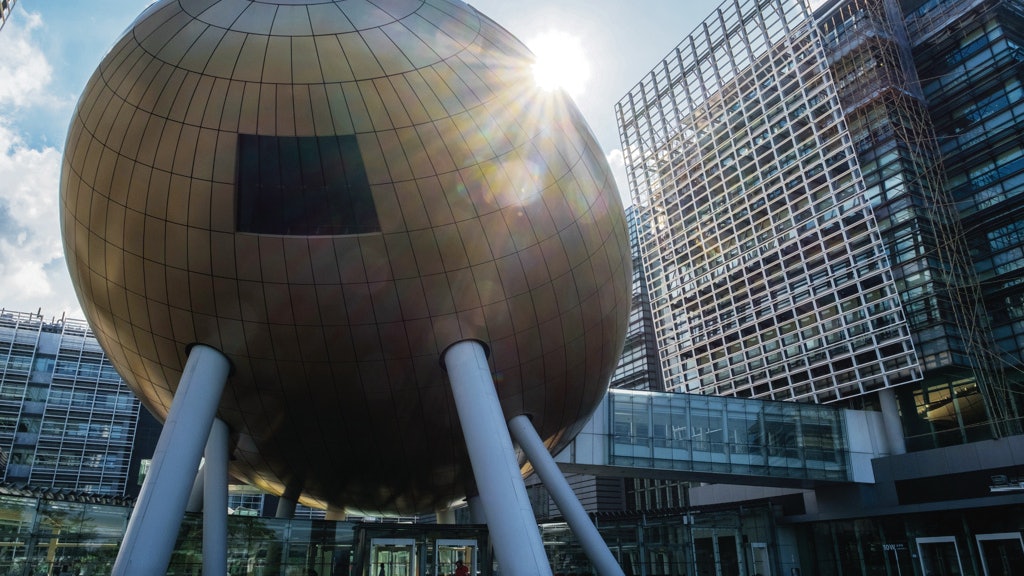From the anti-amendment campaign to the entry quarantine and social distancing measures under the epidemic, many professionals and expatriate employees have left Hong Kong, and foreigners are also discouraged from coming to Hong Kong.
The Chief Executive, Li Jiachao, has recently repeatedly shouted that Hong Kong needs to grab talents, especially in the fields of innovation, medical care and high-end technology, and at the same time cultivate local talents, and said that he will explain new plans in the "Policy Address".
But the world is also vying for talent and the conditions are good. How can Hong Kong compete with it?
What are the references for other people's plans?
Hong Kong wants to make up for the talents lost in recent years, most of which are mentioned in the financial, medical and education industries.
For example, the HKMA, which employs nearly 1,000 people, lost 7% of its staff last year, while the CSRC and CIRC lost 12% and 16% respectively. The turnover rate is more serious than the previous year.
In addition, the government has also formulated the "Hong Kong Talent List" for the development of key industries. The 13 majors include some industries that Hong Kong is actively expanding, such as FinTech, I&T, creative industries and performing arts, commercial dispute resolution and asset management. The maritime and environmental protection industries that are less noticed.
The Hong Kong government will update the talent list in 2021. Applicants from 11 industries and professional fields that meet the list will be given priority to come to Hong Kong with additional points under the "Quality Talent Admission Scheme".
(File photo/Photo by Gao Zhongming)
Talents come and go, the proportion of Hong Kong is low
In order to fill the vacancies of local talents and make up for the needs of the local economy, the introduction of talents is not only faster, but also helps to train local new blood in the medium and long term.
The only worry is that Hong Kong is not as attractive to the rest of the world as it used to be.
Looking at almost several talent entry programs, most applications have shrunk since 2020, and the number of approvals has also declined.
For the general employment policy for non-mainland talents and professionals, 41,289 visas were approved in 2019, a sharp drop to only 5,701 in the first half of this year.
The only thing showing an upward trend is the Talent Program. Based on the increase in the quota from 2020, the actual number of approved cases rose to 2,004 last year and 1,147 in the first half of this year, mainly from the financial and information technology industries.
However, nearly 90% of the approved applicants are from the Mainland, and overseas applicants are only a minority, lacking diverse backgrounds.
Statistics on the number of people under various types of talent programmes (Dataset of "Information Frontier" and the website of the Immigration Department)
Statistics on the number of people under various types of talent programmes (Dataset of "Information Frontier" and the website of the Immigration Department)
Statistics on the places allocated to the "Quality Migrant Admission Scheme" by region of the applicant (Dataset of "Public Information")
Furthermore, the talents who have been introduced do not feel that Hong Kong is a place worth living for a long time. They flow in and out like the seawater of the Victoria Harbour.
According to Legislative Council documents, the proportion of people who have obtained the right of abode under several talent entry schemes accounted for less than 20% of those who came to Hong Kong seven years ago in 2019.
Don't expect the talent to return after the return to normal
Good birds choose wood for habitation, and talents do the same, and go to the place where they can help themselves and their family's career and life.
From a social point of view, the continuous departure of talents indicates that there are institutional or structural problems in the place.
There are various reasons for local and foreign talents to leave Hong Kong. Some of them come from the political environment after not accepting the turmoil of the amendment bill, and some are unbearable for the compulsory quarantine arrangement under the epidemic. Even the last Chief Executive Carrie Lam Cheng Yuet-ngor admitted that overseas talents felt " impatient".
In addition, some interviewed Hong Kong drifters shared that Hong Kong lacks global technology companies, and it is difficult to integrate into local culture and life, and even bluntly stated that the high property prices and rents made them give up living in Hong Kong.
The People's Action Party of Singapore attaches great importance to the excavation, cultivation and protection of leadership talents.
(Getty Images)
The above mentioned is the push force that moves people out of Hong Kong. In many cases, the decision also involves the pull force in another place.
Now many big cities are also making efforts to attract talents, and the conditions are favorable.
Without going too far, Singapore, which has long been regarded as a competitor to Hong Kong, is recognized as a global leader in the competition for talent.
In fact, the local area is also facing a decline in the number of overseas talents. At the end of 2021, the number of people entering the Employment Pass and S Pass work visa entry plans will drop by more than 10% to 20% compared with the end of 2019.
The epidemic is obviously the main factor, but Prime Minister Lee Hsien Loong did not wait for the day of his recovery. Instead, in his recent National Day speech, he emphasized that the country must focus on how to attract top talents and help the country become a hub for innovation and entrepreneurship. The detailed plan is yet to be announced.
Go back a few months, and Singapore has already launched a big plan to attract people.
As a result, the government has asked to raise the salary threshold of the Employment Pass and S Pass schemes. This move makes companies think twice about whether to hire local people. Wages go up.
Second, the authorities revealed that they will introduce new measures to attract elites with "super skills".
Well-known Chinese and foreign technology companies and pharmaceutical companies have entered Singapore, such as Dyson, ByteDance, Grab, Pfizer, etc., and companies will select elites.
With Zhuyu ahead, it is even more difficult for other places to recruit similar talents and enterprises.
Another example is Shenzhen.
Shenzhen's strategy in attracting talents focuses on supporting facilities and incentives.
Since 2010, the municipal government has launched the "Peacock Plan", which provides hukou for scientific research talents, up to 6 million yuan in incentives and subsidies, plus housing subsidies or ten-year rent-free rent, to attract mainland graduate students studying abroad to Shenzhen.
Even with the recent changes to the scheme, the scheme retains the home purchase and rental subsidy.
Of course, Shenzhen's introduction of well-known domestic enterprises is also a big attractive advantage.
There are few short-term opportunities for Hong Kong to attract companies
Talents are to be snatched back, and Li Jiachao leading the government to "take part in the war" in Hong Kong is worth seeing.
Hong Kong has its own advantages, especially the intersection of Chinese and Western economy and culture, the rule of law, bilingual ability, business efficiency, and convenient transportation.
However, to increase its advantages and catch up with the pace of Shenzhen and Singapore, Hong Kong is obviously insufficient at present.
Quarantine-free customs clearance has not yet expired, the living index is higher than that of Singapore, and housing prices and rents are the highest in the world. If it is easy to waive taxes or rent subsidies for professional property buyers, it is also against the consistent policy of regulating the property market. Controversial and ineffective.
In the short term, the Government can improve the existing immigration scheme.
First of all, the approval time should be aligned with that of the Technology Talent Entry Scheme, that is, the target of two-week approval, so that those who intend to come to Hong Kong can leave as soon as possible.
Secondly, the ETOs stationed abroad should strengthen the attraction of overseas talents to Hong Kong to increase the number of talents and diverse backgrounds.
According to the research of the Youth Association, the high property prices and high rents in Hong Kong have affected the absorption of overseas talents.
(file picture)
For new applicants, the government can grant a fixed rent subsidy in the first two to three years after they arrive in Po. However, the target should not be the group with the highest qualifications and higher financial ability, but young people who have recently obtained a master's or doctoral qualifications. After all, it is they who need to reduce their living burden the most, and this will also increase their sense of belonging to Hong Kong.
In addition, in view of the rebound of young mainlanders coming to Hong Kong to study at universities this year, they will stay in Hong Kong for a long time. Institutions and the government should help them adapt to local life as soon as possible, and strive for them to settle down and become new forces contributing to society.
Relatively speaking, Hong Kong is better able to attract talents in the medium and long term.
This is based on the preliminary formation of the new infrastructure.
Bi Jianwen, President of the Productivity Council, revealed good news in April this year. Some of the world's top foreign research institutes intend to settle in Xintian Science and Technology City, and the Science and Technology City provides flexibility to allow enterprises to build their own talent apartments.
If everything is accomplished and construction is accelerated, a chain effect will be exerted. With an enterprise, the housing problem will be solved, and it will be much easier to attract talents.
Although the COVID-19 epidemic has hampered the flow of global population, the thirst for talents has continued unabated. However, Hong Kong has encountered a brain drain in the competition for talents, threatening the long-term development of the economy and the people.
Only when the government leads the fight for enterprises and talents, improves its immigration policies and actively attracts investment, can Hong Kong be assured of achieving self-governance and prosperity.



/cloudfront-eu-central-1.images.arcpublishing.com/prisa/3I74UEXLYRBBRPGPSGWNN6WXH4.jpg)






/cloudfront-eu-central-1.images.arcpublishing.com/prisa/KMEYMJKESBAZBE4MRBAM4TGHIQ.jpg)


